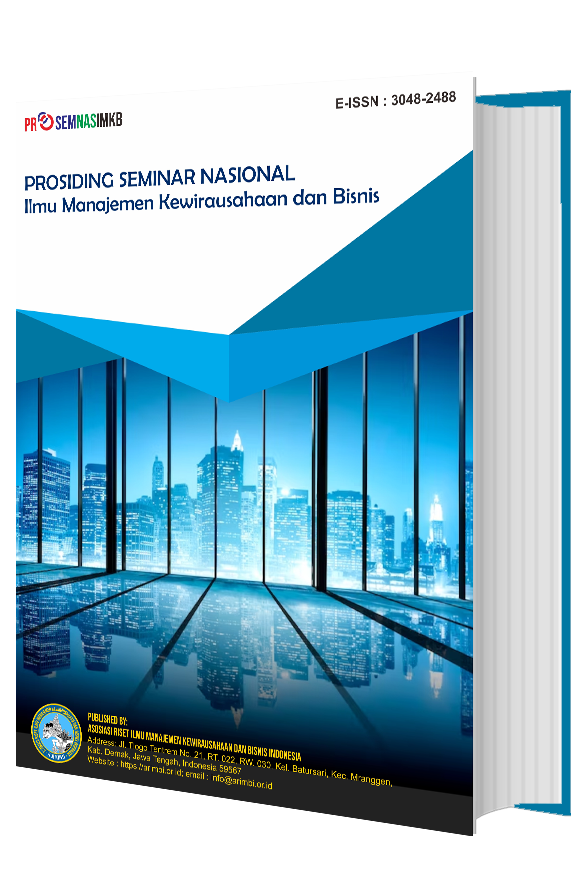Faktor Minat Menjadi Technopreneurship di Kalangan Siswa Kejuruan: Analisis Bibliometrik
DOI:
https://doi.org/10.61132/prosemnasimkb.v2i1.160Keywords:
technology entrepreneurship, Bibliometric, TechnopreneurshipAbstract
Bibliometric analysis is a method for examining metadata derived from articles or journals, including information such as citations, authors, publication years, and countries (Andres, 2009). This analysis consists of three main stages: data collection, analysis, and communication. In the initial stage, data were collected using the Publish or Perish (PoP) application, drawing from the Scopus database with the keyword “technopreneurship” for the period 2014–2024. This study aims to explore the research landscape in the field of technopreneurship and technology-based entrepreneurship published in Scopus. For the query process, the search string TITLE-ABS-KEY ("technology entrepreneurship") was used to identify documents containing significant elements such as printed books, e-learning, and database systems that indicate co-occurrence within technology entrepreneurship literature.
Downloads
References
C. D. (2023). A potential framework for an impactful technopreneurship education. Indonesian Journal of Business & Entrepreneurship, 9(2). https://doi.org/10.17358/ijbe.9.2.208
Dana, L. P., Crocco, E., Culasso, F., & Giacosa, E. (2023). Mapping the field of digital entrepreneurship: A topic modeling approach. International Entrepreneurship and Management Journal, 1–35.
Daud, S., & Nordin, M. S. (2023). Entrepreneurship in technical and vocational education and training: A bibliometric review. Sciences, 13(3), 741–766.
Gaurav, K., Mahato, J., & Sinha, N. (2024). Technopreneurial emergence: Unraveling institutional strategies of higher education institutions – A case study of National Institute of Technology Jamshedpur. International Research Journal of Modernization in Engineering Technology and Science. https://doi.org/10.56726/IRJMETS48428
Husna, A. F., & Sofyan, H. (2023). Structural model of technopreneurship intentions on the performance of electrical lighting installation practices in vocational high school. Jurnal Edukasi Elektro, 7(1). http://dx.doi.org/10.21831/jee.v4i1.32616
Kurnianingsih, I., Rosini, R., & Erza, E. K. (2020). Library class: Model pembelajaran literasi informasi tingkat sekolah dasar (Studi kasus SD Madania). Jurnal Perpustakaan Pertanian, 27(2), 51–58. https://doi.org/10.21082/jpp.v27n2.2018.p51-58
Mulyany, R., Muhammad, S., Geumpana, T. A., Halim, H., Amiren, M., & Pertiwi, A. (2021). Melalui motivasi. Jurnal Ekonomi Pendidikan dan Kewirausahaan, 2(2), 223–235. https://doi.org/10.26740/jepk.v2n2.p223-235
Nikraftar, T., Hosseini, E., & Mohammadi, E. (2021). The factors influencing technological entrepreneurship in nanotechnology businesses. Revista de Gestão, 29(1), 76–99. https://doi.org/10.1108/REGE-02-2021-0029
Nurhayati, D., Machmud, A., & Waspada, I. (2020). Technopreneurship intention: Studi kasus pada mahasiswa dipengaruhi entrepreneurial learning. Jurnal Ekonomi Pendidikan dan Kewirausahaan, 8(1), 79–92. https://doi.org/10.26740/jepk.v8n1.p79-92
Okorie, N. N., Kwa, D. Y., Olusunle, S. O. O., Akinyanmi, A. O., & Momoh, I. M. (2014). Technopreneurship: An urgent need in the material world for sustainability in Nigeria. European Scientific Journal, 10(30), 59–73. https://doi.org/10.19044/esj.2014.v10n30p59
Purwati, A. A., Hamzah, Z., & Hamzah, M. L. (2023). Green techno-entrepreneurship model on student business performance: The mediating role of competitive advantage. Cogent Business & Management, 10(3), 2287273. https://doi.org/10.1080/23311975.2023.2287273
Puspitaningsih, F. (2017). Pengaruh efikasi diri dan pengetahuan kewirausahaan terhadap minat berwirausaha. [Unpublished manuscript].
Rafiana, N. N. (2024). Technopreneurship strategy to grow entrepreneurship career options for students in higher education. ADI Journal on Recent Innovation, 5(2), 110–126. https://doi.org/10.34306/ajri.v5i2.995
Ramlee, N. A. Z., Abd Rahim, L. N., Rahim, H. L., & Ahmad, N. N. (2023). Bibliometric analysis of technopreneurship research in Scopus database. Information Management and Business Review, 15(3 SI), 359–368.
Rojoki Manullang, D., & Waspada, I. (2022). Peran self efficacy dalam memoderasi pengaruh digital literacy terhadap entrepreneurial intention. Jurnal Riset Pendidikan Ekonomi, 7(2), 118–129. https://doi.org/10.21067/jrpe.v7i2.6797
Rusilowati, U., Oganda, F. P., Rahardja, R., Nurtino, T., & Aimee, E. (2023). Innovation in smart marketing: The role of technopreneurs in driving educational improvement. Aptisi Transactions on Technopreneurship, 5(3), 305–318. https://doi.org/10.34306/att.v5i3.359
Suarman, S. (2017). Development of technopreneurship-based entrepreneurship education for students at Universitas Riau, Indonesia. International Journal of Economic Research. http://www.serialsjournal.com
Syahza, A. (2021). Metodologi penelitian (Edisi Revisi). Unri Press.
Syahza, A., Bakce, D., & Asmit, B. (2021). Ekonomi pembangunan: Teori dan kajian empirik pembangunan pedesaan. UR Press.
Tahir, T., Hasan, M., & Said, I. (2021). Pengaruh literasi ekonomi dan literasi digital terhadap minat berwirausaha mahasiswa. Indonesian Journal of Economics, Entrepreneurship, and Innovation, 2(1), 18–27.
Tajeddini, K., Martin, E., & Ali, A. (2020). Enhancing hospitality business performance: The role of entrepreneurial orientation and networking ties in a dynamic environment. International Journal of Hospitality Management, 90, 102605. https://doi.org/10.1016/j.ijhm.2020.102605
Tajpour, M., & Hosseini, E. (2019). The effect of human and social capital on entrepreneurial activities: A case study of Iran and implications. Entrepreneurship and Sustainability Issues, 6(3), 1440–1453. http://doi.org/10.9770/jesi.2019.6.3(24)
Downloads
Published
How to Cite
Issue
Section
License
Copyright (c) 2025 Prosiding Seminar Nasional Ilmu Manajemen Kewirausahaan dan Bisnis

This work is licensed under a Creative Commons Attribution-ShareAlike 4.0 International License.






